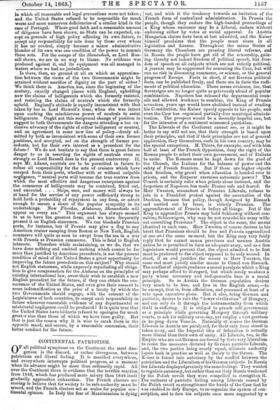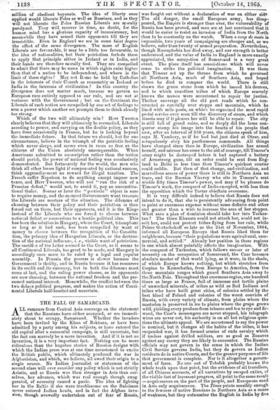CONTINENTAL PATRIOTISM.
OF all political symptoms on the Continent the most dan- gerous is the discord, or rather divergence, between patriotism and liberal feeling. It is manifest everywhere, and everywhere interrupts political progress at a moment when its advance might be more than ordinarily rapid. All over the Continent there is evidence that the terrible reaction from 1848, which has produced more misery than 1848 itself ;gradually approaches exhaustion. The French electors are ceasing to believe that for society to be safe authority must be armed, and the French electors act as scales for popular con- tinental opinion. In Italy the fear of Mazzinianism is dying
out, and with it the tendency towards an imitation of the French form of centralized administration. In Prussia the
people, though they- endure the high-handed proceedings of
a King whose successor may be a Liberal, endure without endorsing either by votes or social approval. In Austria Hungarian claims have been at last admitted, and the Kaiser himself proclaims that the people must share in all legislation and finance. Throughout the minor States of Germany the Chambers are pressing liberal reforms, and in Russia the people have got rid of the censorship, gain- ing thereby not indeed freedom of political speech, but free- dom of speech on all subjects which are not strictly political. A journal may be suppressed for censuring the Czar, but will run no risk in discussing commerce, or science, or the general progress of Europe. Facts in short, if not Russian political facts, can be published freely, and there are in facts the rudi- ments of political education. There seems evidence, too, that Sovereigns are no longer quite so grievously afraid of popular combination. Napoleon has released the departmental coun- cils and allowed workmen to combine, the King of Prussia seventeen years ago would have abolished instead of evading his Constitution, the Kaiser openly appeals to his people, and even the Czar has organized partially-free municipal adminis- tration. The prospect would be a decently-hopeful one, but for the intrusion of a sentiment misnamed patriotism.
The Liberals of the Continent cannot see, or it might be better to say will not see, that their strength is based upon their principles, and that if their principles are not of general application, they themselves, each in his own country, may be the special exceptions. M. Thiers, for example, and with him half at least of the French Opposition, deny the right of the Roman people to select their own government, and of Italians to unite. The Romans must be kept down for the good of the Church, the Italians for the balance of power and the safety of French frontiers. But if those are higher objects than freedom, why growl when education is handed over to priests, and the Emperor exercises autocratic power ? The Church is certainly safer when priests alone instruct, and the despotism of Napoleon has made France safe and feared. So Herr Twesten, staunchest of Prussian Liberals, refuses to join in a Frankfort protest against the annexation of the Duchies, because that policy, though designed by Bismark
and carried out by force, is strictly Prussian. The aggrandizement of Prussia is before all things. But if the King to aggrandize Prussia may hold Schleswig without con- sulting Schleswigers, why may he not remodel his army with- out consulting Prussians ? The object is the same, the means identical in each case. Herr Twesten of course desires in his heart that Prussians should be free and Prussia aggrandized at one and the same moment, but the King may very fairly reply that he cannot annex provinces and menace Austria unless he is permitted to form an adequate army, and as a free legislature would prevent that, the object admitted to be first must be preferred to the object supposed to be only second. In short, if an end justifies the means to Herr Twesten, the same end must justify similar means to Count von.Bismark. The conflict of objects produces a moral paralysis which a King may perhaps afford to disregard, but which sorely weakens a party whose necessary and indispensable base is a moral
principle. So in Austria the German population desires very much to be free, and free in the English sense,—to
be exempt, that is, from officialism, and possessed at least of a veto upon executive plans. But it also, being German and
patriotic, desires to rule the "lower civilization" of Hungary, and can only do it through the instrumentality from which itself is suffering. It is obliged to preach self-government as a principle while governing Hungary through military courts, to ask for military economy, yet employ a vast garrison in keeping down Venetia. Naturally of course the German
Liberals in Austria are paralyzed, for their only locus standi is
taken away, and the Imperial idea of federation is actually more liberal than their own of unity. All Liberals, too, in the Empire who are not German are forced by their very liberalism to resist the measures dictated by German patriotic Liberals, and, the two parties being nearly equal, ultimate authority lapses back in practice as well as theory to the throne. The Kaiser is forced into autocracy by the conflict between the patriotism and the Liberalism of his German subjects. In Russia the Liberals displayed precisely the same feelings. They wanted to regulate autocracy, but rather than see Holy Russia weakened by the Polish revolt they were compelled to strengthen it.
The outburst of patriotic feeling among Liberals caused by the Polish revolt so strengthened the hands of the Czar that he
was enabled to defy Europe, to re-organize the system of con- scription, and to face his subjects once more supported by a
million of obedient bayonets. The idea of liberty once applied would liberate Poles as well as Russians, and as they will not liberate the Poles Russian Liberals are morally paralyzed. They will recover in time, no doubt, for the human mind has a glorious capacity of inconsistency, but meanwhile they have armed their opponents till they are irresistible. Even in England we see in some faint degree the effect of the same divergence. The mass of English Liberals are favourable, it may be a little too favourable, to the idea of nationalities, but their patriotism forbids them to apply that principle either in Ireland or in India, and their hands are therefore morally tied. They are compelled to admit that there may be eases in which rights exist higher than that of a nation to be independent, and where is the limit of those rights ? May not Rome be held by Catholics in the interests of their Church as reasonably as Ireland or India in the interests of civilization ? In this country the divergence does not matter much, because we govern no European race entirely opposed to our rule, and are not at variance with the Government ; but on the Continent the Liberals of each nation are compelled by one set of feelings to arm a power which another set prompts them to think already too strong.
Which of the two will ultimately win ? Herr Twesten clearlybelieves that they will ultimately be reconciled, Liberals acceding to power, and carrying on the double policy, as they have done occasionally in France, but he is looking beyond the immediate future. In that future we should, but for one circumstance, believe in the triumph of the patriotic feeling which never sleeps, and seems even in races as free as the citizens of the Union absolutely unconquerable. When Americans submitted to conscription rather than the nation should perish, the power of national feeling was conclusively demonstrated. But fortunately for the world, the men who think all other losses light if compen.ated by national success, think aggrandizement no reward for illegal taxation. The French suffer Napoleon to do anything except impose new taxes, and Herr Twesten, who will not "run the risk of a Prussian defeat," would not, to avoid it, pay an unconstitu- tional tildes. Sooner or later the "patriotic" object is sure to require money, and the moment Governments want treasure the Liberals are masters of the situation. The dilemma of choosing between their policy and their patriotism is then forced not on them, but their opponents, and it is the Kings instead of the Liberals who are forced to choose between national defeat or concessions to a hostile political idea. This bas been the solution in Hungary, where the Court, triumphant as long as it had cash, bas been compelled by want of money to choose between the recognition of the Constitu- tion, the primary idea of Hungarian Liberals, or the destruc- tion of the national influence, i. e., visible want of patriotism. The sacrifice of the latter seemed to the Court, as it seems to all Continental Liberals, too great to be made, and Hungary is accordingly once more to be ruled by a legal and popular assembly. In Prussia the process is Blower because the Government is thrifty, and in Russia because it has resources in its credit and its currency, but in both the dilemma must come at last, and the ruling power choose, as its opponents are now choosing, between the national freedom and the pre- sumed national interest. Meanwhile, the conflict between the two delays political progress, and makes the action of Conti- nental Liberals half-hearted and uncertain.































 Previous page
Previous page